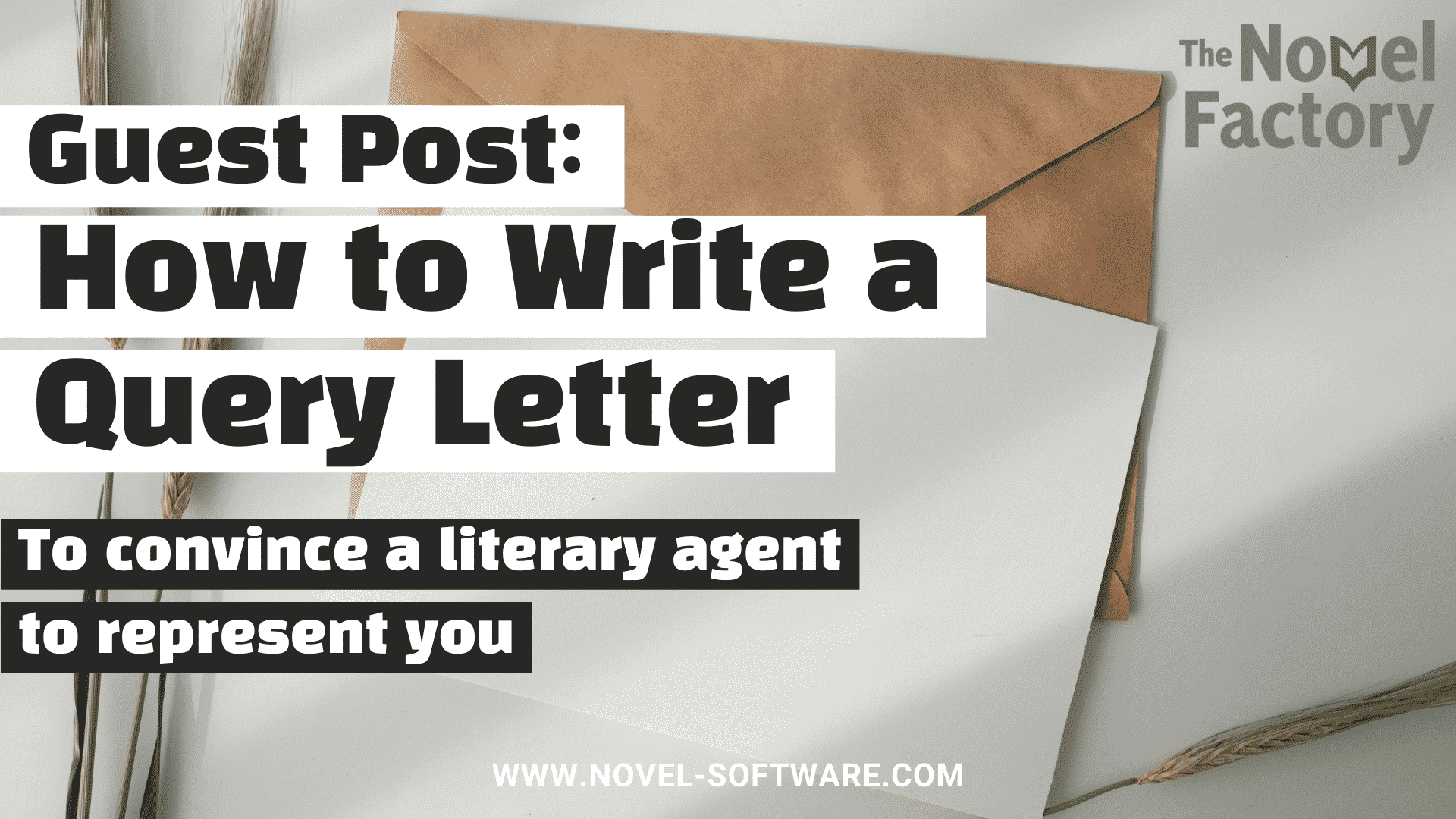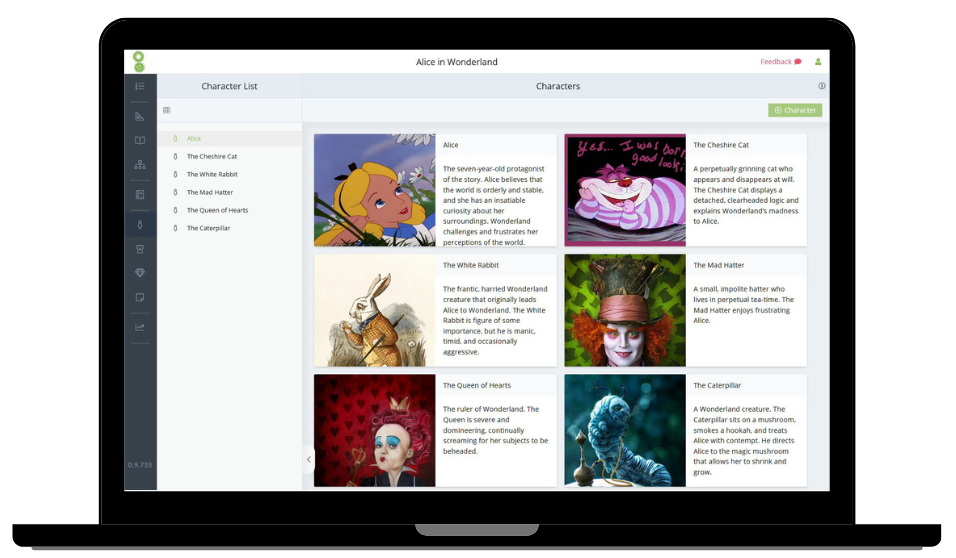
GUEST POST: How to Write a Query Letter
So you’ve finished your manuscript—congratulations! Penning a novel is no small achievement.
But if you’re aiming for publication, your job is far from done.
You have another writing project that rivals your manuscript in importance: your query letter.
A query letter (also known as a cover letter) is a short pitch of your manuscript and yourself, which you send to a literary agent, to convince them to represent your book and help you land a publishing deal.
If you’re planning to self-publish your book, you don’t need a query letter. You can just upload your book to Amazon and have buyers download the eBook file, or you can include a print-on-demand option for physical copies. Self-publishing has many benefits—it’s much faster, you generally retain all the creative rights, and the royalties are normally much higher. But because traditional publishing includes support from an experienced, professional team working to push your book toward success, it can increase your reach and readership.
Traditional publishing is more likely to get your book onto the shelves of brick-and-mortar bookstores and gives you a much better chance of making the bestseller list. Additionally, traditionally published books are often viewed as more prestigious than self-published books because they are eligible for respected awards.
But if you want to go the traditional publishing route, you’ll almost certainly need an agent, and to get an agent, you need a query letter.
Here are some tips for writing a killer query letter and landing a great literary agent.
Have Your Manuscript Edited
Before you start pitching your manuscript, make sure it’s pitch ready. It should already have been through multiple revisions, informed by beta reader feedback.
The biggest mistake many new writers make is sending their manuscript to agents before it’s really ready. Even with the number they read, agents remember stories, so you might not get a second chance.
If you have the funds, you can hire a developmental editor whose advice can be invaluable for resolving structural issues and dealing with problem plot holes. You can also apply for community based mentoring and story development services such as through Write Mentor.
To tighten up your manuscript, clear up ambiguous wording, and improve the flow of your prose, you can engage line editing and copy editing services, or use an app such as Pro Writing Aid. This will ensure you’re submitting the best version of your story.
Literary agents respond more positively to authors who have invested the time and effort to present a polished manuscript.
Find the Right Agents to Pitch
Target your pitches by carefully selecting the most suitable agents.
You can find listings of literary agents worldwide at https://querytracker.net/ (free) and Agent Match (free trial, then subscription), or you could just do a Google search for literary agents in your country.
The key things to find out are if they are open to queries, and whether they represent your genre.
Every literary agent has their own genres or themes that they represent, and it won’t do much good to pitch your mystery thriller novel to a historical romance agent (unless your mystery thriller novel is also a historical romance book). You’d be surprised at how many agents report getting queries for genres they don’t represent – which is a very surefire way to get a rejection. Look up each prospective agent’s credentials and background to avoid fraudulent actors. If you want to save time and effort, you can also just obtain contact information for agents relevant to your manuscript from a specialist service.
Follow Each Agent’s Submission Guidelines
Agents follow different pitching processes. Carefully read your prospective agent’s submission guidelines and follow them to a T to avoid having your manuscript rejected before the agent even reads your query letter. The submission guidelines show what to include in your package and where to send your query. They may even provide guidelines for the structure of your query letter.

Personalize Your Query Letter
Don’t write one query letter and send it to scores of agents—at least, not without customizing it each time. You need to show each agent you’ve done your research and decided they’re a good fit for your book. Address each agent by their name, which may even be listed in the submission guidelines.
Explain why you think the agent would be a good fit for your manuscript. Does it fit in perfectly with the type of manuscripts they’re looking for? Is it comparable to previous books or authors they’ve represented? Did another publishing industry professional recommend contacting them? If you’ve previously met with the agent, mention that as well.
Hook the Agent
The first—and arguably most important—part of your query letter is the hook. This is how you draw in the agent and pique their interest in your manuscript, so write it thoughtfully. Because there’s no one-size-fits-all approach to writing a query letter hook, experiment with what works best for your manuscript.
One strategy is to add the personalized aspects here, such as your previous contact with the agent at a conference or your love for previous novels they’ve represented. If you don’t have any such connections with the agent, it’s okay to just jump into the meat of the letter, stating that you’re looking for representation of your novel. Include the title, genre, and word count of your novel in your query letter, too.
Alternatively, jump right into your story and hook the agent with intrigue. This is a more creative approach, and it can be tricky to condense the 80,000+ words of your novel into a few short sentences. You’re essentially selling your book here—your goal is to get the agent interested in seeing more.
Create a Teaser
Once you’ve hooked the agent, dive into the details of your book. But not too much detail, of course, since you’re limited to a few hundred words. Lay out the central themes and conflicts in your story in an intriguing and interesting way, like in a book blurb. Unless the submission guidelines instruct you otherwise, don’t give away spoilers—your goal is to get a full manuscript request from the agent. Make them want to read your story.
Add Your Bio
Your query letter isn’t all about your book—it’s also about you! Any prospective literary agent is interested in your publishing or writing history and why you’re the best person to tell this story. Keep it brief. Don’t add anything that’s not relevant to your manuscript.
Mention any books you’ve previously published and any literary awards you’ve received. If you attend yearly literary conferences, mention that. If you’ve graduated from a creative writing program or taken other writing courses, include that. If your book touches on a specialty subject, describe your background in that subject. If you have an audience on a specific platform, include details about the platform and the size of your audience. If relevant, include your inspiration for writing your manuscript.

Emulate the Tone in Your Book
Your query letter is meant to sell your book to a literary agent, and that really means selling your writing. Give the agent a preview of your writing skills before they read the manuscript. Try to emulate the style you used in your book, to the extent possible.
If you wrote a book with a lot of humor in the narration, inject some of that humor into your query letter. If your book is written in short, suspenseful sentences, let that shine through in your hook and synopsis. If your prose is elegant and flowery, show that off in your query letter. But be careful: brevity is the key to success in a query letter. Identify the best way to emulate the writing style in your book in the 300 to 400 words of your query letter.
Be Concise
Whatever your writing style, in a query letter, be concise. Cut the fluff and filler and state the relevant information clearly and confidently. An unspoken rule in the publishing industry is that your query letter can never exceed one page.
Craft a maximally informative letter in just a few hundred words. Show off your writing skills—after all, writing is all about effective communication. If you need help, professional editors know all about concise writing.
Don’t Be Arrogant
You want to sell your book, but you don’t want to oversell it. You probably haven’t written the next Harry Potter. You’re probably not the next Stephen King. Don’t call your manuscript “the next bestseller” or compare it to treasured classics. These sorts of statements reflect badly on your character (and don’t forget that you’re selling yourself too). That you’re pitching your manuscript already indicates your high opinion of it.

But Be Confident
While you don’t want to be arrogant in your query letter, you don’t want to self-deprecate, either. If you aren’t confident in your manuscript, the agent won’t see any reason to be, either. Don’t add in lines like “I hope I’m not wasting your time” or “Sorry if this isn’t what you’re looking for.” If you believe your book deserves to be published, you’re not wasting the agent’s time. If you’ve done your research and are querying an agent looking for manuscripts in your genre, it is what they’re looking for. Even if you face a slew of rejections—and you probably will, since even the best authors have—you must maintain a confident tone in your query letter.
Type Your Query Letter and Use a Standard Font
Your query letter must be typed in a standard font (Times New Roman or Arial) in a standard size (11 or 12). It may be boring, but if you want to land an agent, you must follow the style rules of the industry. Show off your unique qualities and merits in the content of your letter, not its physical appearance.
Optional – Have Your Query Letter Edited
Once you’ve written your query letter, you could have it professionally edited before you customize it and send it off. It’s short—it shouldn’t be more than 400 words—so it won’t cost that much, and having a professionally polished query letter is invaluable. This letter is your chance to sell your manuscript to each individual agent.
Optional – Have Your Query Letter Written
If you’re intimidated by the query letter process, you don’t have to tackle it yourself. At QueryLetter.com, for example, you can have industry professionals write your query letter for you after reading your full manuscript. Other services include writing a synopsis and manuscript outline and providing detailed contact information for relevant agents likely to be interested in your manuscript.

Never Give Up
You’re likely to face rejection—there’s hardly an author alive who hasn’t. The successful ones are those who’ve just never given up. If you’re struggling, you can always make more revisions to your manuscript or start on a fresh project. What’s important is to always keep moving forward.
Luke Palder is a serial entrepreneur who runs a number of online companies largely focused on language services. He graduated from Yale College with a degree in political science and, while a student, wrote a nonfiction book about human trafficking.
His businesses include ProofreadingServices.com and QueryLetter.com. His team provides high-quality and competitively priced services to authors, academics, businesspeople, and anyone else in need of language services. He is passionate about making these services maximally accessible and is constantly innovating and expanding his businesses.
Unlock your writing potential
If you liked this article by the Novel Factory, then why not try the Novel Factory app for writers?
It includes:
- Plot Templates
- Character Questionnaires
- Writing Guides
- Drag & Drop Plotting Tools
- World Building resources
- Much, much more


